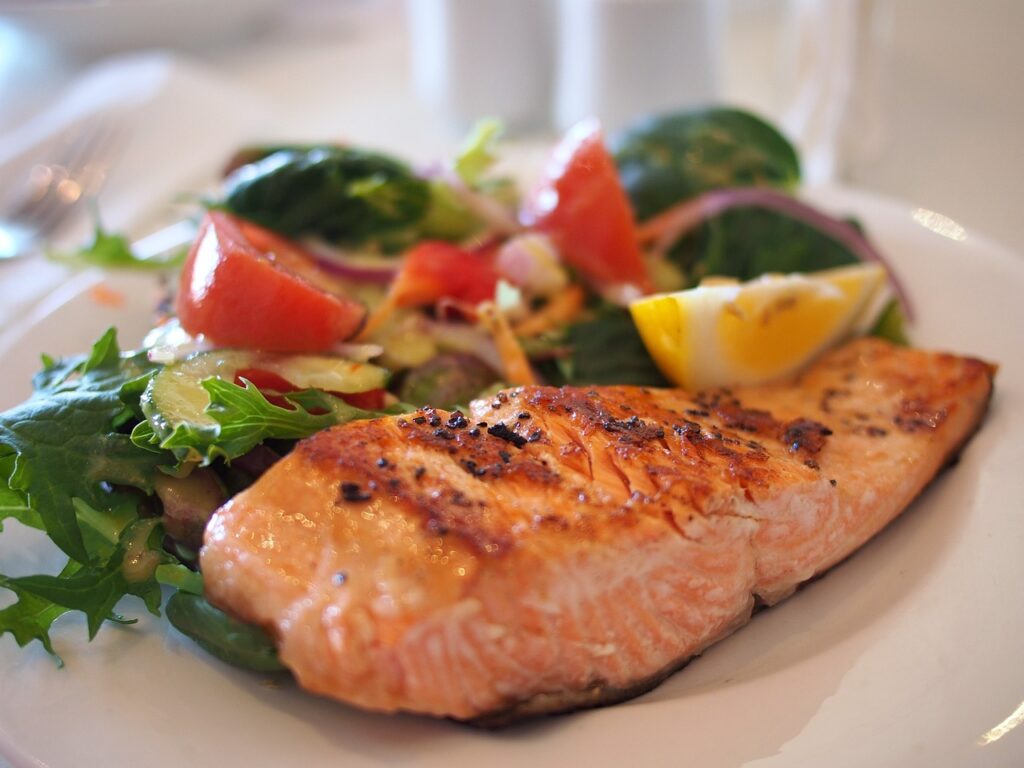Inflammation is a natural process that helps the body heal and repair itself. However, when uncontrolled, it can lead to various health problems, including heart disease, arthritis, autoimmune disorders, cancer, and neurodegenerative diseases. Factors such as refined sugars, processed foods, unhealthy fats, and excessive red meat consumption can fuel inflammation. Chronic stress, lack of sleep, gut dysbiosis, and environmental toxins can exacerbate inflammation.
Anti-inflammatory foods can help combat inflammation and promote overall well-being. Fruits and vegetables, fatty fish, healthy fats, spices and herbs, and fiber-rich foods can all be beneficial. However, a holistic approach to health is essential, including managing stress, prioritizing sleep, engaging in regular physical activity, limiting alcohol and processed foods, and consulting a healthcare professional. By understanding and embracing the power within, individuals can better manage their health and reduce the negative effects of inflammation.

Chronic inflammation, a silent fire smoldering beneath the surface, is increasingly recognized as a root cause of various health woes, from heart disease and arthritis to autoimmune disorders and even dementia. While medications can offer temporary relief, they often come with unwanted side effects. This is where the power of anti-inflammatory foods steps in, offering a natural and sustainable approach to manage inflammation and optimize your health.
Here are 5 delicious ways to reduce inflammation with these anti-inflammatory foods:
- Berry Nice Smoothie: Berries are loaded with antioxidants called anthocyanins, which have anti-inflammatory properties. Combine your favorite berries with yogurt, almond milk, and a touch of honey for a refreshing and anti-inflammatory smoothie.
- Salmon with Avocado Salsa: Fatty fish like salmon are rich in omega-3 fatty acids, which can help reduce inflammation. Pair salmon with a vibrant avocado salsa for a delicious and nutritious meal. Avocados are also a good source of healthy fats and antioxidants.
- Turmeric Veggie Bowl: Turmeric is a spice that contains curcumin, a compound with powerful anti-inflammatory properties. Add turmeric to roasted vegetables for a healthy and flavorful bowl. Other vegetables that are good for reducing inflammation include leafy greens, broccoli, and peppers.
- Extra Virgin Olive Oil Drizzled on Everything: Extra virgin olive oil is a great source of healthy fats and antioxidants. Drizzle it on salads, vegetables, or even popcorn for an anti-inflammatory boost.
- Dark Chocolate for Dessert: Dark chocolate is not only delicious, but it also contains antioxidants that can help reduce inflammation. Choose dark chocolate with at least 70% cacao for the most health benefits.
These are just a few ideas to get you started. With a little creativity, you can easily incorporate anti-inflammatory foods into your diet and enjoy delicious and healthy meals.
Additional Tips:
- Limit processed foods, sugary drinks, and unhealthy fats in your diet. These can contribute to inflammation.
- Drink plenty of water to stay hydrated.
- Manage stress. Stress can worsen inflammation.
- Get regular exercise. Exercise can help reduce inflammation throughout the body.
By following these tips, you can help reduce inflammation and improve your overall health.
Remember, it is always best to talk to your doctor before making any major changes to your diet or exercise routine.
Contents
Deep Dive into the Inflammation Epidemic and the Power of Anti-Inflammatory Foods
Inflammation is a natural process that helps the body heal and repair itself. However, when uncontrolled, it can lead to various health problems, including heart disease, arthritis, autoimmune disorders, cancer, and neurodegenerative diseases. Factors such as refined sugars, processed foods, unhealthy fats, and excessive red meat consumption can fuel inflammation. Chronic stress, lack of sleep, gut dysbiosis, and environmental toxins can exacerbate inflammation.
Anti-inflammatory foods can help combat inflammation and promote overall well-being. Fruits and vegetables, fatty fish, healthy fats, spices and herbs, and fiber-rich foods can all be beneficial. However, a holistic approach to health is essential, including managing stress, prioritizing sleep, engaging in regular physical activity, limiting alcohol and processed foods, and consulting a healthcare professional. By understanding and embracing the power within, individuals can better manage their health and reduce the negative effects of inflammation.

The Anti-Inflammatory Food Pharmacy
Anti-inflammatory foods include fruits and vegetables like blueberries, leafy greens, cruciferous vegetables, bell peppers, oranges, tomatoes, and sweet potatoes. Fatty fish like salmon, sardines, mackerel, and tuna are rich in omega-3 fatty acids, which reduce inflammation markers and protect against chronic diseases.
Healthy fats like olive oil and avocado oil are rich in monounsaturated fats and polyphenols. Nuts and seeds like almonds, walnuts, chia seeds, and flaxseeds provide healthy fats, fiber, and other nutrients that combat inflammation. Spices and herbs like turmeric, ginger, garlic, and black pepper also contain anti-inflammatory compounds. Fiber-rich foods like whole grains like brown rice, quinoa, oats, and whole-wheat bread provide fiber, prebiotics, and essential nutrients.
Experiment with different flavors and recipes to make healthy eating enjoyable and sustainable. To maximize the benefits of these foods, eat a diverse diet, incorporate them into your regular diet, opt for organic, fresh, or minimally processed options, and listen to your body.Let’s delve deeper into some key players:
Unleash the Rainbow Power: Fruits & Veggies for Inflammation Fighting
Fruits and vegetables are a powerful tool against inflammation. Berries, which contain antioxidants like anthocyanins, act as antioxidants, shielding cells from damage and reducing inflammation. Leafy greens, rich in vitamins, minerals, and antioxidants, promote gut health and reduce inflammation.
Cruciferous vegetables like broccoli, cauliflower, Brussels sprouts, and cabbage contain sulforaphane, a compound with anti-inflammatory properties. These vegetables also support the body’s natural detoxification process, eliminating harmful substances that contribute to inflammation. Other anti-inflammatory fruits and vegetables include bell peppers, oranges, tomatoes, and sweet potatoes.
Spices like turmeric, ginger, and garlic also have anti-inflammatory potential. Making small, sustainable changes towards a diet rich in these nutrients can yield big results. Experiment and discover the delicious ways to nourish your body and fight inflammation naturally. Check out farmers markets or seasonal produce sections for fresh, flavorful options.
Dive Deep into Omega-3 Wonders: Fatty Fish for Inflammation Relief
Fatty fish, such as salmon, sardines, mackerel, and tuna, are rich in omega-3 fatty acids, particularly EPA and DHA. These fish help reduce inflammation markers, modulate immune function, and support gut health. Experts recommend at least two servings of fatty fish per week to nourish the body and fight inflammation.
If incorporating fatty fish into your diet is challenging, consider omega-3 supplements. Cooking fish properly, such as baking, grilling, or poaching, preserves the omega-3s. Look for fish labeled “wild-caught” or “sustainably sourced” to ensure quality. Fatty fish are just one part of an anti-inflammatory approach, and combining them with other nutrient-rich foods, stress management, and sleep can lead to a healthier, inflammation-free future.
Ditch the Bad, Embrace the Good: Healthy Fats for Inflammation Relief
Healthy fats, such as olive oil, avocado oil, and nuts, are essential for inflammation relief. Monounsaturated fats, particularly those found in olive oil, can reduce inflammation markers and protect against chronic diseases like heart disease and arthritis. They also contribute to heart health by lowering bad cholesterol and increasing good cholesterol. These fats are rich in antioxidants and vitamins, while nuts offer protein, fiber, and other essential nutrients. To incorporate these fats, aim for a healthy dose daily, opt for extra virgin olive oil and unrefined avocado oil, and pair them with other anti-inflammatory powerhouses like fruits, vegetables, and omega-3-rich fish. Remember, healthy fats are calorie-dense, so enjoy them in moderation.
Spice Up Your Life and Fight Inflammation: The Power of Herbs and Spices
Herbs and spices are not just culinary wonders but also powerful in fighting inflammation. Turmeric, known as the Golden Warrior, has potent anti-inflammatory properties that may benefit various conditions like arthritis, heart disease, and Alzheimer’s. Ginger, known for its nausea relief and inflammation fighter, has powerful anti-inflammatory and pain-relieving properties. Garlic, with its distinctive flavor and anti-inflammatory force, offers health benefits like heart health, immune function, and blood sugar control. Black pepper, with its active ingredient piperine, enhances
the absorption of other beneficial compounds, like curcumin in turmeric. Pairing herbs and spices with other anti-inflammatory foods like fruits, vegetables, and fatty fish can create a synergistic effect, allowing you to add flavor, fight inflammation, and nourish your body for a healthier, happier you.

Beyond the Plate: A Holistic Approach
While incorporating anti-inflammatory foods is a significant step, remember that optimal health requires a holistic approach. Manage stress through activities like yoga or meditation, prioritize quality sleep, and engage in regular physical activity. Additionally, consider consulting a healthcare professional for personalized guidance tailored to your unique needs and health goals.
Stress Management:
Chronic stress increases inflammation, and stress management tips include yoga, meditation, nature, spending time with loved ones, hobbies, and avoiding negative situations.
Quality Sleep:
Sleep is crucial for managing inflammation and promoting overall health. The body releases hormones like cortisol and growth hormone during sleep, which regulate inflammation. Inadequate sleep disrupts this balance, leading to increased cortisol levels, decreased growth hormone, and a weakened immune system. Chronic inflammation is linked to health problems like heart disease, diabetes, obesity, and neurological disorders.
To achieve quality sleep, adults should follow a regular sleep schedule, relax before bedtime, optimize their sleep environment, limit caffeine and alcohol, and engage in regular exercise. Consistency is key, and if sleep issues persist, consult a healthcare professional to rule out underlying medical conditions.

Regular Physical Activity:
Regular exercise is a powerful tool against inflammation, reducing inflammatory markers, improving immune function, weight management, and stress reduction. Gentle options include walking, swimming, yoga, Tai Chi, and low-impact cardio. Walking is accessible and low-impact, while swimming is suitable for those with joint pain or injuries.
Yoga combines physical postures, breathing exercises, and mindfulness for stress reduction and inflammation control. Tai Chi is an ancient practice that promotes relaxation and reducing inflammation. Low-impact cardio activities like elliptical training, stationary cycling, or water aerobics provide cardiovascular benefits without the high impact of running or jumping. Consistency is key, starting with 15-20 minutes of activity daily and gradually increasing intensity. Always listen to your body’s signals and consult a healthcare professional before starting any new exercise program.
Holistic Healthcare:
A holistic approach to well-being involves incorporating anti-inflammatory foods into your diet, stress management techniques, quality sleep, regular exercise, and positive relationships. Healthy eating, stress management, quality sleep, regular exercise, and positive relationships contribute to overall well-being. Complementary practices like acupuncture, massage therapy, and herbal remedies can also help manage inflammation.
It’s important to find what works best for you and consult a healthcare professional for personalized guidance. By nurturing your body and mind holistically, you can empower yourself to manage inflammation and build a foundation for vibrant health. Remember, self-compassion and positive thinking can support a healthier, inflammation-free life.
Personalized Guidance:
The path to managing inflammation is not a one-size-fits-all approach, as each individual has unique needs, goals, and circumstances. Acknowledging your uniqueness is crucial, as your body’s response to different foods and lifestyle factors can vary greatly.
Underlying health conditions, medications, and gut microbiome also play a role in how your body manages inflammation. Finding sustainable strategies that fit seamlessly into your life is crucial for long-term success. Seeking personalized guidance from healthcare professionals or registered dietitians can be invaluable in crafting a personalized plan.
Being proactive, asking questions, tracking progress, and celebrating small wins are essential steps towards a healthier lifestyle. Building a healthy lifestyle takes time and effort, but with personalized guidance and a commitment to well-being, you can effectively manage inflammation and achieve a vibrant, healthier you.
Conclusion
Inflammation is a common issue in chronic health conditions, and managing it naturally can be achieved through a mindful approach to nourishment. Consuming a variety of fruits, vegetables, heart-healthy fats, spices, and herbs, along with fiber-rich whole grains, legumes, and beans, can help maintain a healthy gut microbiome.
However, food alone is not enough; a holistic approach that prioritizes sleep, stress management, and regular physical activity is also crucial. Consistency is key, and adjusting intake based on individual needs is essential. By incorporating anti-inflammatory foods into your diet, you can ignite your well-being and live a healthier, happier life.
Frequently Asked Questions About Anti-inflammatory Foods
Q: What are some specific anti-inflammatory foods I should add to my diet?
A: While the list isn’t exhaustive, here are some examples:
- Fruits: Berries (blueberries, strawberries, raspberries), cherries, citrus fruits
- Vegetables: Leafy greens (spinach, kale), cruciferous vegetables (broccoli, cauliflower), bell peppers
- Healthy Fats: Olive oil, avocado oil, nuts (almonds, walnuts), fatty fish (salmon, sardines)
- Spices & Herbs: Turmeric, ginger, garlic, black pepper, cinnamon
- Fiber-Rich Powerhouses: Whole grains (quinoa, oats), legumes (beans, lentils), chia seeds
Q: Are there any foods I should avoid?
A: While individual needs vary, it’s generally recommended to limit:
- Processed foods: Processed meats, sugary drinks, refined carbohydrates
- Unhealthy fats: Saturated and trans fats found in fried foods, commercially baked goods, and some red meats
- Added sugar: Sugary drinks, candy, desserts
- Alcohol: Excessive alcohol consumption can contribute to inflammation.
Q: How quickly will I see results from eating anti-inflammatory foods?
A: The effects vary depending on the severity of your inflammation and other lifestyle factors. While you may not see immediate changes, consistency is key. Aim for long-term benefits by making these dietary changes a sustainable part of your life.
Q: Do I need to see a doctor before starting an anti-inflammatory diet?
A: While generally safe, consulting a healthcare professional or registered dietitian is always recommended. They can personalize a plan based on your unique health needs and any existing medical conditions.
Q: What are some other ways to manage inflammation naturally?
A: Combine your anti-inflammatory diet with:
- Quality sleep: Aim for 7-8 hours each night.
- Stress management: Techniques like yoga, meditation, or spending time in nature can help.
- Regular physical activity: Choose activities you enjoy, like walking, swimming, or cycling.
- Mindfulness: Pay attention to your body and mind to identify and manage stress triggers.
Q: Can anti-inflammatory foods cure chronic conditions?
A: While anti-inflammatory foods can be a powerful tool, they may not “cure” existing chronic conditions. However, they can significantly contribute to reducing inflammation and managing symptoms, enhancing overall well-being and potentially improving treatment outcomes.
Remember, this FAQ is for informational purposes only and should not be interpreted as medical advice. Always consult a healthcare professional for personalized guidance.

